 ICRH Global Newsletter ICRH Global Newsletter 30th of October, 2015 |
| PROJECTS |
Feasibility study sexual assault refferal centres in Belgium
The federal state secretary of Equality Elke Sleurs assigned ICRH to investigate which model of sexual assault referral centres (SARC) is most appropriate and feasible in the Belgian context.
The study, which will be conducted by Ines Keygnaert, will firstly review international guidelines and best practices in providing holistic care to victims of sexual violence. We then will map the current approaches in Flanders, Brussels and Wallonia upon which we will make a SWOT analysis of potential models, including their cost effectiveness. Finally, by the end of August 2016 and in collaboration with a vast number of experts from healthcare, psychosocial care, forensics, police, public prosecutors, policy makers and victims, we will develop a Belgian SARC model that can be tested in a Flemish, Brussels and Walloon hospital in the following two years. More information: ines.keygnaert@ugent.be. |
INPAC Project On 24 September, INPAC had its 3rd Policy Advisory Board meeting (PAB) and 2nd Ethics Advisory Board (EAB) meeting of INPAC Project in Beijing, China.
The PAB m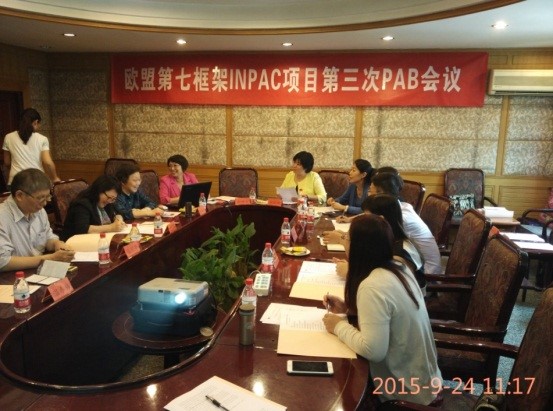 eeting was hosted by the NRIFP and chaired by Prof. Hu Lina. At the beginning of the meeting, the INPAC project leader, Zhang Wei-Hong introduced the project’s progress and the values of INPAC. Prof. Hu presented the difficulties related to the policy translation. All participating experts fully affirmed the values of INPAC and gave useful recommendations about the strategy of translating evidence into policy. The 2nd Ethics Advisor Board meeting was chaired by Prof. Wu Shangchun. Prof Zhang Wei-Hong made a short introduction, especially about relevant issues on ethics of INPAC project. The participating experts had an animated discussion about INPAC ethics, and ethical training of the FP/abortion providers. The meeting resulted in very useful comments and recommendations. eeting was hosted by the NRIFP and chaired by Prof. Hu Lina. At the beginning of the meeting, the INPAC project leader, Zhang Wei-Hong introduced the project’s progress and the values of INPAC. Prof. Hu presented the difficulties related to the policy translation. All participating experts fully affirmed the values of INPAC and gave useful recommendations about the strategy of translating evidence into policy. The 2nd Ethics Advisor Board meeting was chaired by Prof. Wu Shangchun. Prof Zhang Wei-Hong made a short introduction, especially about relevant issues on ethics of INPAC project. The participating experts had an animated discussion about INPAC ethics, and ethical training of the FP/abortion providers. The meeting resulted in very useful comments and recommendations. INPAC presentations at the 8th European Public Health Conference from 14-17 October in Milano, Italy.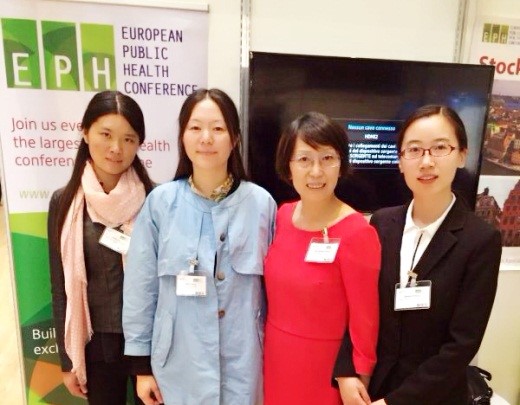
The 8th European Public Health (EPH) Conference, with more than 1,400 participants from over 50 countries, provided an excellent platform for communication and debate among researchers, policy makers, and service managers in the public health and health services fields. Three INPAC consortium members contributed to the conference with oral or poster presentations. Prof. Weihong, Zhang from UG-ICRH presented a poster entitled ‘Induced abortion is a problem of public health in China’. Prof. Hong Jiang from the School of Public Health of Fudan University presented a poster on ‘Opportunities and systems requirements for developing post- abortion family planning in China’. Sasha Wang, also from Fudan University, presented the results of a pilot study on ‘The feasibility of short message reminder on post abortion contraceptive utilization in China’. Yalan Liu from Chongqing Medical University displayed her poster on ‘Contraceptive practices among undergoing abortion: a multicenter observational study in West China’. |
5th DIFFER programme management team meeting ICRH Mozambique hosted the 5th DIFFER annual Project Management Team (PMT) meeting which took place in Maputo from 29 September to 1 October 2015.
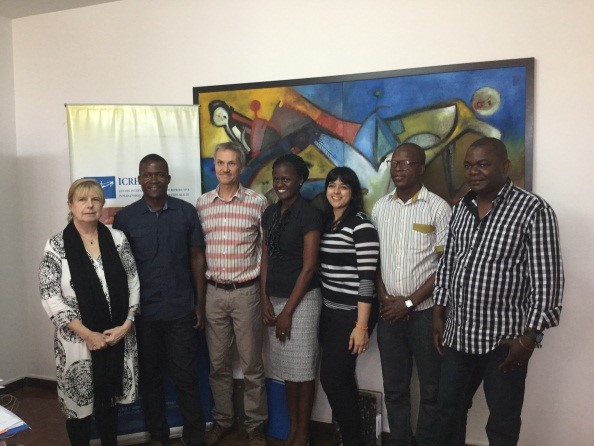 Representatives of ICRH Belgium, ICRH Kenya, MatCH-Research (South Africa) and ICRH Mozambique gathered in Maputo to discuss the progress made in implementing the DIFFER Project (http://differproject.eu/). The representatives of Ashodaya Samithi (India) and University College London (UK) participated through web conferencing. The positive experiences were shared, the main challenges discussed, and the next steps agreed on. After the meeting, the representative of ICRH-Kenya visited the project’s activities in Tete in the North of Mozambique. The project now enters its last year, during which the feasibility, acceptability, sustainability, effectiveness, cost and equity of the intervention package in each country will be evaluated. Representatives of ICRH Belgium, ICRH Kenya, MatCH-Research (South Africa) and ICRH Mozambique gathered in Maputo to discuss the progress made in implementing the DIFFER Project (http://differproject.eu/). The representatives of Ashodaya Samithi (India) and University College London (UK) participated through web conferencing. The positive experiences were shared, the main challenges discussed, and the next steps agreed on. After the meeting, the representative of ICRH-Kenya visited the project’s activities in Tete in the North of Mozambique. The project now enters its last year, during which the feasibility, acceptability, sustainability, effectiveness, cost and equity of the intervention package in each country will be evaluated.
For more information: Alex Lucas, icrh.coord.tete@tvcabo.co.mz / Yves Lafort, Yves.Lafort@ugent.be. |
| EVENTS |
Seminar: sexual and reproductive health and rights in the Sustainable Development Goals This half-day seminar, organized by Be-cause Health, will take place on 18 November, 9:00-12:30 in Brussels.
Sexual and reproductive health and rights, including HIV, are priorities in the new development goals that will replace the Millennium Development Goals as of January 2016. SRHR topics such as ending female genital mutilation, fighting sexual exploitation, the HIV response, maternal health and family planning are part of the overarching health goal (goal 3) or the gender equality goal (goal 5). How will these ambitious targets be reached by 2030 and what is the role of the Belgian Development Cooperation? Programme:
Nadine Krysostan (UNFPA Programme Coordination and Liaison Specialist): Analysis of the SDG process and its content from a SRHR perspective.
Magatte Mbodj (Member of Parliament Senegal, executive Director of Alliance National Contre le Sida): A southern perspective.
Mbengi Loyama Doudou (Chef de bureau Appui Technique Division Provincial de la Santé Tshopo, DR Congo): Implications for the field.
Panel discussion with Nadine Krysostan, Magatte Mbodj, Mbengi Loyama Doudou, Marleen Bosmans (Belgian Development Agency) and Kaat De Nijs (Cabinet Belgian Minister of Development Cooperation) Please register before the 11th of November. More information and registrations: click here |
Infocycle global issues and challenges The Belgian Development Agency offers a training course providing insights in current global issues and the challenges to the achievement of a fair world.
The topics covered include poverty and inequality, global public goods, the climate, economics and trade, global financial flows, migration and development, politics and strategy, human rights and development, as well as communication and technological developments.
During 4 weekends, spread over 2 months, small groups of 25 people explore what today's global challenges are, how they are related, what the possible causes and solutions are and what role one can play as a business, citizen, civil servant or organisation to address these challenges.
The course offers a mix of lectures by renowned experts (including ICRH staff), group discussions, critical reflection and discussions, along with movies and educational games.
A must for everyone who is concerned by international or global topics through his/her job or personal commitment and who wants to gain broader theoretical and practical insights in the matter.
The course is offered in Dutch or French.
More information: http://www.btcctb.org/nl/inhoud-programma
Contact: infocycle@btcctb.org or 02/505.18.37 |
The human factor in RH supply chain management ICRH Mozambique and ICRH Belgium participated in a panel at the 16th Reproductive Health Supplies Coalition (RHSC) Membership Meeting in Oslo.
ICRH Mozambique and ICRH Belgium are currently implementing a study in Manhiça and Marracuene districts (Mozambique) aiming to enhance motivation of family planning service providers as a lever to avoid stock-outs and increase quality of services. The study is funded by the Innovation Fund, which is the RHSC’s flagship i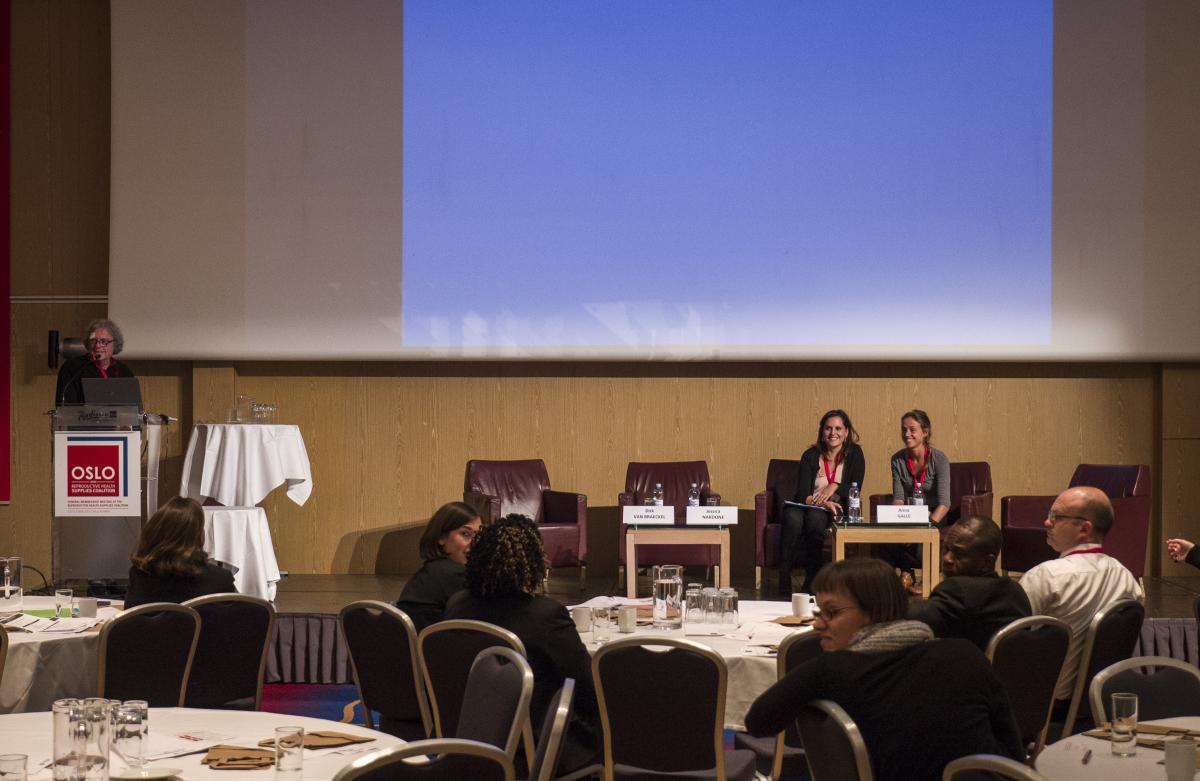 nitiative for financing new activities that further the Coalition’s strategic goal. The outline and the first results of the ICRH project were presented by ICRH researcher Anna Galle in a panel session on ‘the human factor in supply chain management’, together with a project from Bioforce Institute, France in Burkina Faso. Dirk Van Braeckel chaired the session. nitiative for financing new activities that further the Coalition’s strategic goal. The outline and the first results of the ICRH project were presented by ICRH researcher Anna Galle in a panel session on ‘the human factor in supply chain management’, together with a project from Bioforce Institute, France in Burkina Faso. Dirk Van Braeckel chaired the session.
ICRH Belgium also joined over 40 other organisations to become a member of the Reproductive Health Supplies Coalition’s Take Stock campaign and ICRH Mozambique will follow soon. Take Stock is working to mobilize public health leaders, facilitate the development of a common language that we can all use to talk about stockouts of reproductive health supplies and gathers commitments needed to spur real action. More details about the membership meeting and Take Stock campaign can be found on the website: http://www.rhsupplies.org/, http://noemptyshelves.org/ |
| ICRH PEOPLE |
Vacancy for research assistant
ICRH Belgium is recruiting a 50% research assistant for the INPAC project.
INPAC aims at integrating post-abortion family planning services into existing abortion services in hospital settings in China and at evaluating the effectiveness of interventions in terms of reduction of unwanted pregnancies and repeat abortions. The project is conducted by an international con-sortium which consists of four partners in China and three in Europe. We are now recruiting a re-search assistant with excellent knowledge of both English and Chinese. Starting date is as soon as possible, with a contract until February 2017.
More information on the tasks and the candidate’s profile can be found here.
Candidates are requested to send their application with motivation letter and curriculum vitae in English to icrh@ugent.be before 15 November 2015. |
Kristien Michielsen 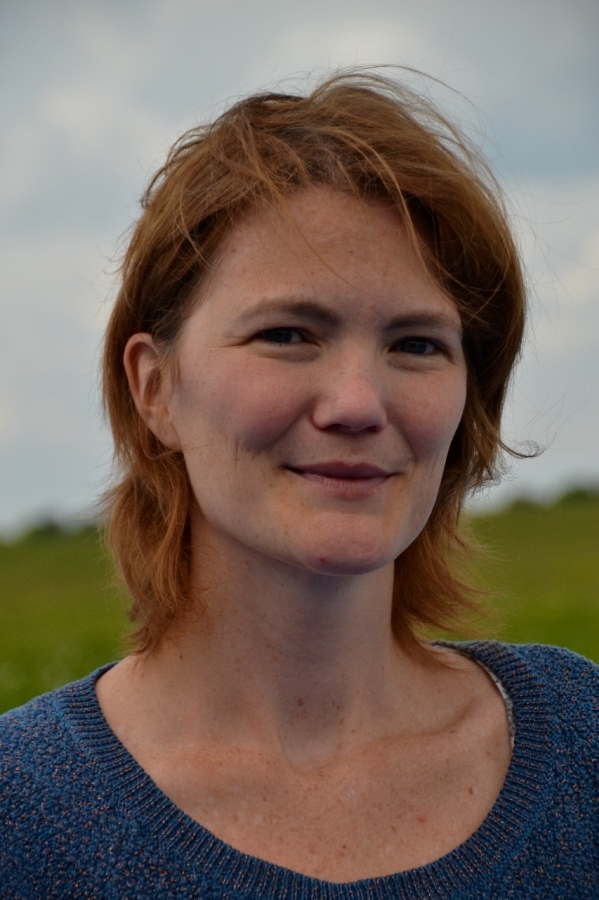 ICRH postdoctoral researcher Kristien Michielsen has been appointed assistant professor at Ghent University from 1 October 2015 on. ICRH postdoctoral researcher Kristien Michielsen has been appointed assistant professor at Ghent University from 1 October 2015 on.
Kristien is a trained social scientist and obtained a PhD in Social Medical Sciences from Ghent University in 2012. She has been working for ICRH since 2006, and in this period her research mainly focused on sexual and reproductive health and well-being of adolescents and young people, in several countries in Africa, Latin America and Europe.
Kristien’s research experience includes both quantitative methods- setting up (longitudinal controlled) trials, survey development and implementation and analysis (SPSS, Stata) - and qualitative methods - in-depth interviews, focus group discussions, narratives, and analysis (NVivo), and systematic literature research.
More information: kristien.michielsen@ugent.be.
|
Longmei Tang
 Longmei Tang stays at ICRH to do research for her joint PhD project between Hebei Medial University and Ghent University. Longmei Tang stays at ICRH to do research for her joint PhD project between Hebei Medial University and Ghent University.
Longmei Tang is affiliated to the Public Health School of Hebei Medical University, China, where she works in the department of Epidemiology and Statistics. She obtained her master degree in 2002 majoring in Epidemiology and Statistics. After graduation, she focused on the study of epidemiology and health statistic methods for 13 years. She has been involved as main researcher in several provincial and ministerial-level projects and has published more than 20 scientific papers in national and international journals. Since May 2015, she is enrolled as joint PhD student at Ghent University and Hebei Medical University. Her research focuses on induced abortion in China, and is related to the ongoing EC-funded FP7 INPAC project. Her supervisors are Prof. Marleen Temmerman and Prof. Wei-Hong Zhang of ICRH, and Prof. Wu Dianwu of Hebei Medical University. |
Mozambican researchers staying at ICRH Belgium
Five Mozambican PhD scholars are spending a few months in the ICRH offices in Gent.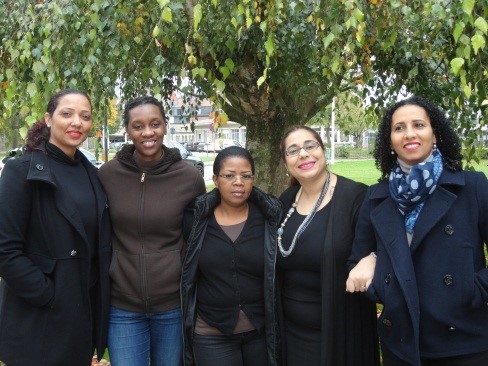
They are working on their PhD research projects, that are taking place within the framework of the DESAFIO programme, a long-term collaboration programme between all Flemish Universities and the University Eduardo Mondlane in Maputo, Mozambique.
From left to right on the picture: Eunice Jethá, Beatriz Manuel Chongo, Mónica Frederico, Cátia Abdul Fattahe Taibo and Maria Emília Gonçalves. |
Anna and Elizabeth
Two Ugandan researchers are staying in Gent to work on a project on comprehensive sexuality education in Uganda.
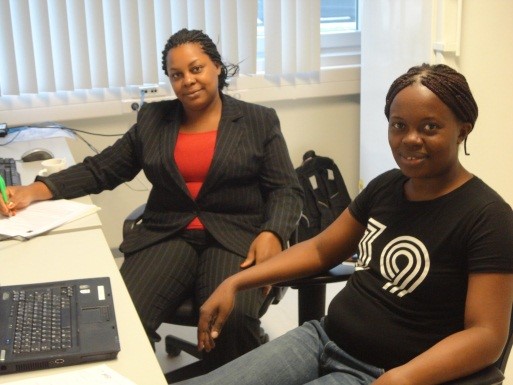 Anna B Ninsiima and Elizabeth Kimigisha are working on the VLIR-UOS funded project ‘Mitigating adverse sexual and reproductive health outcomes through a comprehensive primary school sexuality education program in South-Western Uganda’. The project aims at improving sexual and repro-ductive health of young adolescents through comprehensive sexuality education that is led by an interdisciplinary university students team in an environment where no consistent or regulated sexual and reproductive health education program currently exists. Belgian project partners are ICRH/Ghent University and RHEA/Free University of Brussels. Ugandan partners are Mbarara Uni-versity of Science and Technology and Uganda Martyrs University, Institute of Ethics and Development Studies. Anna B Ninsiima and Elizabeth Kimigisha are working on the VLIR-UOS funded project ‘Mitigating adverse sexual and reproductive health outcomes through a comprehensive primary school sexuality education program in South-Western Uganda’. The project aims at improving sexual and repro-ductive health of young adolescents through comprehensive sexuality education that is led by an interdisciplinary university students team in an environment where no consistent or regulated sexual and reproductive health education program currently exists. Belgian project partners are ICRH/Ghent University and RHEA/Free University of Brussels. Ugandan partners are Mbarara Uni-versity of Science and Technology and Uganda Martyrs University, Institute of Ethics and Development Studies.
Anna and Elizabeth will stay in Ghent until the end of December. |
| PUBLICATIONS |
Well-being of women, adolescents and children
In a special BMJ supplement, public health experts from around the globe highlight the critical actions and investments that will have the greatest impact on the health and well-being of wom-en, children and adolescents.
The 15 papers in this special supplement outline the current evidence, identify successes as well as critical gaps in progress, and highlight key priorities to end preventable deaths and ensure that women, children and adolescents can thrive and build resilient and prosperous societies. The pa-pers provide the evidence that has helped inform the development of a new Global Strategy for Women’s, Children’s and Adolescents’ Health, which was launched at the United Nations General Assembly in New York on 26 September 2015.
The new Global Strategy to prevent deaths and improve the health of millions of women, children and adolescents builds on new evidence and lessons learnt. It focuses on reaching everyone, in particular critical population groups many of whom live in humanitarian and fragile settings – where a majority of these deaths happen.
Link to full supplement: http://www.bmj.com/content/women%E2%80%99s-children%E2%80%99s-and-adolescents%E2%80%99-health-0 |
Contraceptive choice in the EU
IPPF EN launched a new ‘Barometer’ for women’s access to modern contraceptive choice in 16 EU countries.
The report analyses how easily women in 16 EU countries can access modern contraceptives. It finds that overall, the situation in most countries has stagnated or worsened in recent years.
The EU countries covered by the report are: Bulgaria, Cyprus, Czech Republic, Denmark, Finland, France, Germany, Ireland, Italy, Latvia, Lithuania, The Netherlands, Poland, Romania, Spain, and Sweden. Information on participating national partners can be found in the report.
The report’s findings are based on information about the national policy landscapes provided by national experts in each of the 16 countries, using a series of policy benchmarks that are key to en-suring access to modern contraceptives. The information was collected, analysed and reviewed between May and November 2014.
The report is endorsed by the European Society of Contraception and Reproductive Health (ESC) and by ICRH an can be downloaded HERE. |
Anaemia, syphilis and HIV care in Mozambique
Implementation of point-of-care diagnostics leads to variable uptake in rural maternal and child health clinics.
Anaemia, syphilis and HIV are high burden diseases among pregnant women in sub-Saharan Africa. A quasi-experimental study was conducted in four health facilities in Southern Mozambique to evaluate the effect of point-of-care technologies for haemoglobin quantification, syphilis testing and CD4+ T-cell enumeration performed within maternal and child health services on testing and treatment coverage, and assessing acceptability by health workers.
Demographic and testing data on women attending first antenatal care services were extracted from existing records, before (2011) and after (2012) introduction of point-of-care testing. Study outcomes per health facility were compared, while inverse variance weights were used to adjust for possible cluster effects in the pooled analysis. A structured acceptability-assessment interview was conducted with health workers before and after.
After implementation of point-of-care testing, there was no significant change in uptake of overall haemoglobin screening, syphilis screening and CD4+ T-cell testing. Initiation of antiretroviral therapy for treatment eligible women was similar in the weighted analysis before and after, with variability among the sites. Time from HIV diagnosis to treatment initiation decreased. A generally good ac-ceptability for point-of-care testing was seen among health workers.
Point-of-care CD4+ T-cell enumeration resulted in a decreased time to initiation of antiretroviral therapy among treatment eligible women, without significant increase in testing coverage. Overall haemoglobin and syphilis screening increased. Despite the perception that point-of-care technolo-gies increase access to health services, the variability in results indicate the potential for detri-mental effects in some settings. Local context needs to be considered and services restructured to accommodate innovative technologies in order to improve service delivery to expectant mothers.
De Schacht C, Lucas C, Sitoe N, Machekano R, Chongo P, Temmerman M, Tobaiwa O, Guay L, Kas-saye S, Jani IV. Implementation of Point-of-Care Diagnostics Leads to Variable Uptake of Syphilis, Anemia and CD4+ T-Cell Count Testing in Rural Maternal and Child Health Clinics. PLoS One. (2015) 10(8): e0135744. |
Couple based family planning education in Jimma Zone, Ethiopia.
A study aimed at measuring the effect of a six-month-long family planning education program on male involvement in family planning, as well as on couples’ contraceptive practice.
The study (quasi-experimental research among 811 married couples in Jimma Zone, southwest Ethiopia) consisted of an intervention and a control group for comparative purpose; and surveyed before and after the implementation of the intervention (family planning education, given to both men and women at the household level in the intervention arm, in addition to monthly community gatherings). During the intervention period, households in the control group were not subject to particular activities but had access to routine health care services.
Follow-up data were obtained from 760 out of 786 couples who were originally enrolled in the survey. Findings were compared within and between groups before and after intervention surveys. At the baseline, contraceptive use in both control and intervention households were similar. After the intervention, the authors observed among men in the intervention arm a significantly higher level of willingness to be actively involved in family planning compared to the men in the control arm. In addition, the difference between spouses that discussed family planning issues was less reported within the control group, both in the case of men and women. In general, a significant, positive difference in male involvement was observed. Concerning contraceptive use, there was change observed among the intervention group who were not using contraception at baseline.
This study showed that family planning educational intervention, which includes both spouses and promotes spousal communication, might be useful to foster contraceptive practice among couples. The results also offer practical information on the benefits of male involvement in family planning as a best means to increase contraceptive use. Thus, providing opportunities to reinforce family planning education may strengthen the existing family planning service delivery system.
Tilahun T, Coene G, Temmerman M, Degomme O. Couple based family planning education: changes in male involvement and contraceptive use among married couples in Jimma Zone, Ethiopia. BMC Public Health. (2015) 15: 682. |
Smoking and pregnancy
Role of midwives and gynaecologists in smoking cessation in Flemish pregnant women.
The objectives of this study were to explore knowledge, beliefs and practice among midwives and gynaecologists concerning a smoking cessation policy for pregnant women and their partners, and to examine if midwives and gynaecologists do have a role in smoking cessation in pregnant women.
A qualitative study was performed a using semi-structured interviews with nine midwives and eight gynaecologists. Data were analysed using deductive content analysis.
The national smoking cessation policy seemed to be insufficiently known. ‘Ask’ and ‘Advise’ were part of a standard prenatal consultation, the next three steps were rarely implemented. Participants had a negative image of ‘the smoking pregnant woman’: a low educated woman with a smoking partner and ‘bad examples’ in their history. Reported barriers were fear of provoking resistance and lack of time and communication skills regarding smoking cessation.
The findings suggest that training in communication skills and dealing with resistance should be offered, i.e. by using motivational interviewing. It could be considered that a trained midwife or tobaccologist is part of an obstetrical team or that the AAR-method (Ask-Advise-Refer) is used.
De Wilde K, Tency I, Steckel S, Temmerman M, Boudrez H, Maes L. Which role do midwives and gynecologists have in smoking cessation in pregnant women? - A study in Flanders, Belgium. Sex Reprod Healthc. (2015) 6(2): 66-73. |
Fetal alcohol syndrome
Prevalence of fetal alcohol syndrome in a South African city with a predominantly Black African population.
Fetal alcohol spectrum disorder (FASD) and fetal alcohol syndrome (FAS) are common in some South African populations, notably those of mixed ancestry descent in rural areas and small towns. Little is known about FAS/FASD prevalence in the majority of South Africans: city dwellers of Black African ethnicity. This study describes the prevalence of FAS in a South African city, comparing 2 suburbs with predominantly mixed ancestry that house over 60% of the city population.
A tiered, active case ascertainment study for the prevalence of FAS was conducted. All first-grade learners in the 2 suburbs were eligible for anthropometric screening, and screen-positive learners were assessed for dysmorphic features of FAS. Those with suggestive clinical features received neurocognitive assessment, and maternal or collateral interview. Final diagnosis was made following a case conference.
Complete ascertainment of FAS status was made in 94.7% of eligible learners. Overall, FAS was diagnosed in 5.5% and FASD in 6.4%. Levels of FAS were high in both areas. No cases were previously diagnosed. The mortality rate for mothers of FASD children 29% & 9.7%.
Prevalence of FAS is high in both suburbs, and the lack of prior diagnoses indicates that awareness remains low. The unexpectedly high burden of FAS in an urban area with predominantly Black African population mandates extension of surveillance and intervention measures in southern Africa.
Urban MF, Olivier L, Viljoen D, Lombard C, Louw JG, Drotsky LM, Temmerman M, Chersich MF. Prevalence of fetal alcohol syndrome in a South African city with a predominantly Black African population. Alcohol Clin Exp Res. (2015) 9(6): 1016-26. |
Vaginal microbiome
Correlates of the molecular vaginal microbiota composition of African women in Kenya, Rwanda, South Africa and Tanzania.
Sociodemographic, behavioural and clinical correlates of the vaginal microbiome (VMB) as characterized by molecular methods have not been adequately studied. VMB dominated by bacteria other than lactobacilli may cause inflammation, which may facilitate HIV acquisition and other adverse reproductive health outcomes.
The VMB of women in Kenya, Rwanda, South Africa and Tanzania (KRST) was characterized using a 16S rDNA phylogenetic microarray. Cytokines were quantified in cervicovaginal lavages. Potential sociodemographic, behavioural, and clinical correlates were also evaluated.
Five VMB clusters were identified: one cluster each dominated by Lactobacillus crispatus (KRST-I) and L. iners (KRST-II), and three clusters not dominated by a single species but containing multiple (facultative) anaerobes (KRST-III/IV/V). Women in clusters KRST-I and II had lower mean concentrations of interleukin (IL)-1? and Granulocyte Colony Stimulating Factor (G-CSF), but higher concentrations of interferon-?-induced protein (IP-10) than women in clusters KRST-III/IV/V. A lower proportion of women in cluster KRST-I tested positive for bacterial sexually transmitted infections (STIs) and urinary tract infection (UTI), and a higher proportion of women in clusters KRST-I and II had vaginal candidiasis but these associations did not reach statistical significance. Women who reported unusual vaginal discharge were more likely to belong to clusters KRST-III/IV/V.
Vaginal dysbiosis in African women was significantly associated with vaginal inflammation; the associations with increased prevalence of STIs and UTI, and decreased prevalence of vaginal candidiasis, should be confirmed in larger studies.
Gautam R, Borgdorff H, Jespers V, Francis SC, Verhelst R, Mwaura M, Delany-Moretlwe S, Ndayisaba G, Kyongo JK, Hardy L, Menten J, Crucitti T, Tsivtsivadze E, Schuren F, van de Wijgert JH; Vaginal Biomarkers Study Group. Correlates of the molecular vaginal microbiota composition of African women. BMC Infect Dis. (2015) 15: 86. |
Kesho Bora trial findings
Early infant feeding patterns and HIV-free survival in Burkina Faso, Kenya & South Africa.
The association between feeding patterns and HIV-free survival in children born to HIV-infected mothers was investigated to clarify whether antiretroviral (ARV) prophylaxis modifies the association.
HIV-infected pregnant women were counselled regarding infant feeding options, and randomly assigned to triple-ARV prophylaxis (triple ARV) until breastfeeding cessation (BFC) before age 6 months or antenatal zidovudine with single-dose nevirapine (short-course ARV). Eighteen-month HIV-free survival of infants HIV-negative at 2 weeks of age was assessed by feeding patterns.
Of the 753 infants alive and HIV-negative at 2 weeks, 28 acquired infection and 47 died by 18 months. Overall HIV-free survival at 18 months was 0.91. In the short-course ARV arm, HIV-free survival (0.88) did not differ by feeding patterns. In the triple ARV arm, overall HIV-free survival was 0.93 and BFC <3 months was associated with lower HIV-free survival than BFC ≥3 months and replacement feeding. In the triple ARV arm, 4 of 9 transmissions occurred after reported BFC (and 5 of 19 in the short-course arm), indicating that some women continued breastfeeding after interruption of ARV prophylaxis.
In resource-constrained settings, early weaning has previously been associated with higher infant mortality. It was shown that, even with maternal triple-ARV prophylaxis during breastfeeding, early weaning remains associated with lower HIV-free survival, driven in particular by increased mortality.
Cournil A, Van de Perre P, Cames C, de Vincenzi I, Read JS, Luchters S, Meda N, Naidu K, Newell ML, Bork K; Kesho Bora Study Group. Early infant feeding patterns and HIV-free survival: findings from the Kesho-Bora trial (Burkina Faso, Kenya, South Africa). Pediatr Infect Dis J. (2015) 34(2): 168-74. |
Alcohol and HIV
Impact of alcohol on HIV prevention and treatment for South Africans in primary healthcare.
Antiretroviral treatment (ART) has substantially reduced morbidity and mortality for HIV patients. In South Africa, with the largest ART programme globally, attention is needed not only on the further expansion of ART coverage, but also on factors which undermine its effectiveness, such as alcohol use. Given the decentralised approach of nurse-initiated and -sustained ART in the South African primary health sector, it is important to document key aspects of alcohol use to be conveyed to HIV-positive individuals and those at risk for HIV.
This study comprised a narrative review of relevant literature.
Alcohol acts through both behavioural and physiological pathways to impact on the acquisition, further transmission and then progression of HIV disease. Besides links to risky sex, alcohol undermines the immune system, raising susceptibility to contracting and then countering HIV and other infections. There are important drug interactions between alcohol and ART, or therapies for opportunistic infections and other co-morbidities. Moreover, alcohol undermines adherence to the medication which is essential for effective ART.
Primary healthcare clinic attendees need evidence-based information on the detrimental effects of alcohol consumption on HIV infection, which ensue throughout the clinical course of HIV. This spans the role of alcohol consumption as a risk factor for HIV infection, HIV replication in infected individuals, a person's response to HIV infection and HIV treatment. Primary healthcare workers, especially nurses and HIV counsellors, require training in order to screen for and provide appropriate interventions for HIV-positive patients, those on treatment and treatment-naïve patients, who will benefit from reduced alcohol consumption or the cessation thereof.
Schneider M, Chersich M, Temmerman M, Degomme O, Parry CD. The impact of alcohol on HIV prevention and treatment for South Africans in primary healthcare. Curationis. (2014) 37(1): 1-8. |
|
 ICRH Global Newsletter
ICRH Global Newsletter  nitiative for financing new activities that further the Coalition’s strategic goal. The outline and the first results of the ICRH project were presented by ICRH researcher Anna Galle in a panel session on ‘the human factor in supply chain management’, together with a project from Bioforce Institute, France in Burkina Faso. Dirk Van Braeckel chaired the session.
nitiative for financing new activities that further the Coalition’s strategic goal. The outline and the first results of the ICRH project were presented by ICRH researcher Anna Galle in a panel session on ‘the human factor in supply chain management’, together with a project from Bioforce Institute, France in Burkina Faso. Dirk Van Braeckel chaired the session. Longmei Tang stays at ICRH to do research for her joint PhD project between Hebei Medial University and Ghent University.
Longmei Tang stays at ICRH to do research for her joint PhD project between Hebei Medial University and Ghent University.
 Anna B Ninsiima and Elizabeth Kimigisha are working on the VLIR-UOS funded project ‘Mitigating adverse sexual and reproductive health outcomes through a comprehensive primary school sexuality education program in South-Western Uganda’. The project aims at improving sexual and repro-ductive health of young adolescents through comprehensive sexuality education that is led by an interdisciplinary university students team in an environment where no consistent or regulated sexual and reproductive health education program currently exists. Belgian project partners are ICRH/Ghent University and RHEA/Free University of Brussels. Ugandan partners are Mbarara Uni-versity of Science and Technology and Uganda Martyrs University, Institute of Ethics and Development Studies.
Anna B Ninsiima and Elizabeth Kimigisha are working on the VLIR-UOS funded project ‘Mitigating adverse sexual and reproductive health outcomes through a comprehensive primary school sexuality education program in South-Western Uganda’. The project aims at improving sexual and repro-ductive health of young adolescents through comprehensive sexuality education that is led by an interdisciplinary university students team in an environment where no consistent or regulated sexual and reproductive health education program currently exists. Belgian project partners are ICRH/Ghent University and RHEA/Free University of Brussels. Ugandan partners are Mbarara Uni-versity of Science and Technology and Uganda Martyrs University, Institute of Ethics and Development Studies.

 eeting was hosted by the NRIFP and chaired by Prof. Hu Lina. At the beginning of the meeting, the INPAC project leader, Zhang Wei-Hong introduced the project’s progress and the values of INPAC. Prof. Hu presented the difficulties related to the policy translation. All participating experts fully affirmed the values of INPAC and gave useful recommendations about the strategy of translating evidence into policy. The 2nd Ethics Advisor Board meeting was chaired by Prof. Wu Shangchun. Prof Zhang Wei-Hong made a short introduction, especially about relevant issues on ethics of INPAC project. The participating experts had an animated discussion about INPAC ethics, and ethical training of the FP/abortion providers. The meeting resulted in very useful comments and recommendations.
eeting was hosted by the NRIFP and chaired by Prof. Hu Lina. At the beginning of the meeting, the INPAC project leader, Zhang Wei-Hong introduced the project’s progress and the values of INPAC. Prof. Hu presented the difficulties related to the policy translation. All participating experts fully affirmed the values of INPAC and gave useful recommendations about the strategy of translating evidence into policy. The 2nd Ethics Advisor Board meeting was chaired by Prof. Wu Shangchun. Prof Zhang Wei-Hong made a short introduction, especially about relevant issues on ethics of INPAC project. The participating experts had an animated discussion about INPAC ethics, and ethical training of the FP/abortion providers. The meeting resulted in very useful comments and recommendations.
 Representatives of ICRH Belgium, ICRH Kenya, MatCH-Research (South Africa) and ICRH Mozambique gathered in Maputo to discuss the progress made in implementing the DIFFER Project (http://differproject.eu/). The representatives of Ashodaya Samithi (India) and University College London (UK) participated through web conferencing. The positive experiences were shared, the main challenges discussed, and the next steps agreed on. After the meeting, the representative of ICRH-Kenya visited the project’s activities in Tete in the North of Mozambique. The project now enters its last year, during which the feasibility, acceptability, sustainability, effectiveness, cost and equity of the intervention package in each country will be evaluated.
Representatives of ICRH Belgium, ICRH Kenya, MatCH-Research (South Africa) and ICRH Mozambique gathered in Maputo to discuss the progress made in implementing the DIFFER Project (http://differproject.eu/). The representatives of Ashodaya Samithi (India) and University College London (UK) participated through web conferencing. The positive experiences were shared, the main challenges discussed, and the next steps agreed on. After the meeting, the representative of ICRH-Kenya visited the project’s activities in Tete in the North of Mozambique. The project now enters its last year, during which the feasibility, acceptability, sustainability, effectiveness, cost and equity of the intervention package in each country will be evaluated.